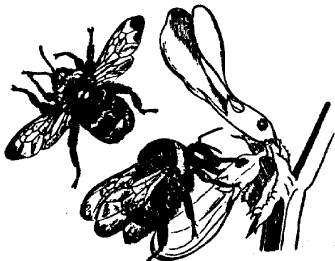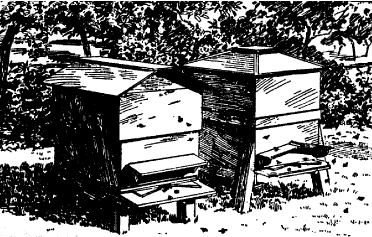![]()

![]()

The honey bee has more myths and folk-lore woven into our knowledge of it than any other insect. It would probably be true to say that they are more valued than any other, although some fear has crept into the idyllic picture of the bees, murmuring drowsily through the flower-beds in summer, or winging their honey-laden way across our meadows at dusk, because of largely fictionalised accounts of killer swarms of bees attacking people with often fatal results, in recent films, due in part to a true scientific error.
In villages at around 1900, nearly all the Vicarages kept bees in their large gardens, and it was quite common to see the hives with the Vicar attending them on a calm sunny day, possibly collecting the honey to sell at a forthcoming Church Fête, or to present a jar to an ailing or elderly parishioner. And not only the Parsonages of the day, but many other large gardens would have perhaps three or more hives in them. Until quite recent times, in a Suffolk village, there was an old bee-keeper who regularly talked to his bees, and claimed to be able to interpret their response by the pitch of their buzzing. The custom of "telling the bees" was practised in old rural communities up to sixty or seventy years ago. A typical account of it was taken from an old gentleman, who said if there was a death in the family, it was usual to take a bit of crepe and pin it on the bee-hives after sunset. Then you gently tapped the hives and told the bees who it was had died. If you didn't do this, they reckoned the bees wouldn't stay, or else they'd pine away and die. The "wisdom of the bees" and "secret knowledge of the bees" were more than just poetic phrases to the bee-keepers in years gone by.
Many large gardens with bee-keepers would treat the bees as members of the family. In fact, so the belief went, the bees would take offence if not treated properly. They must not be bought or sold, or even taken or given as a present. If a bee-keeper did give a hive away, the recipient would find a way of repaying the kindness with an appropriate gift, or worthwhile service.

Many phrases woven into our common everyday speech refer to some activity or other of the bees. "Busy as a bee" is one; "Make a bee-line for" is another, which refers to the straight line of flight of returning bees to their hives, with honey. Indeed, the bee-hive itself has been used as a trademark to illustrate the industrious use of the article produced. One old superstition has it that if a bee flew into your house, good luck would be sure to follow. In parts of East Anglia and Norfolk, even today, it is still held to be bad luck not to set a bee free if it does come into your house. Another old custom was that of "tinging" or "tanging" the bees, where the good lady of the house would get a swarm to settle by a-tinging her dust-pan with her large door key; yet another old quite widely held country belief was the curative value of the bee-sting for rheumatism or arthritis, and one old Wiltshire Doctor was well known for recommending his patients to start keeping bees.
All this makes us treasure our china honey containers even more, with bees depicted on them, if we are lucky enough to own one. These are becoming increasingly rare nowadays.
written by Rosemary Goulding
![]() Return to the February 1998 Features page
Return to the February 1998 Features page
![]() return to Home page and main index
return to Home page and main index
page last updated 1 FEBRUARY 1998